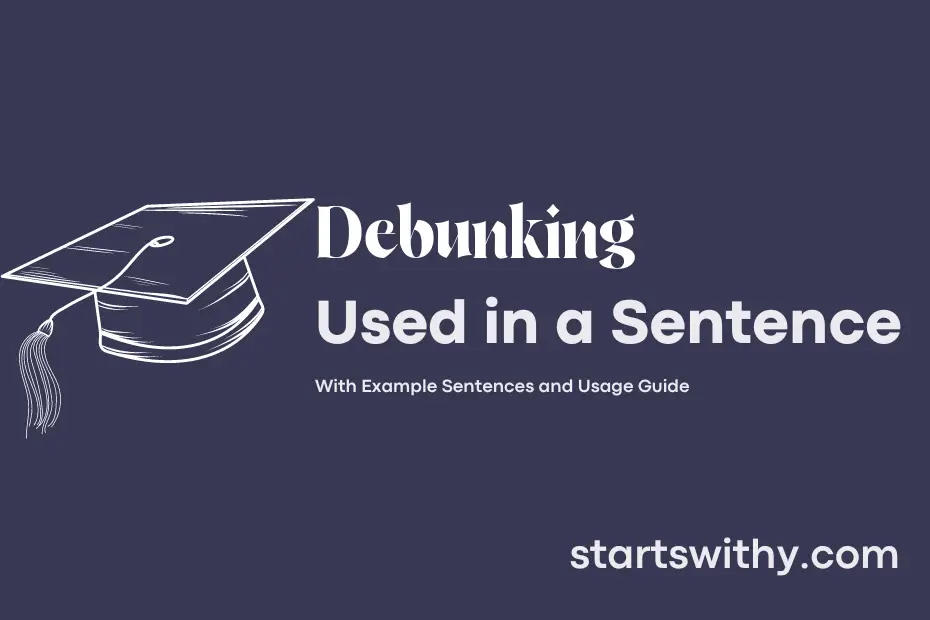Have you ever come across a statement or belief that you felt needed to be challenged or proven wrong? This act of dismantling and exposing false claims or myths is known as debunking.
Debunking involves scrutinizing information, theories, or beliefs to reveal inaccuracies, misconceptions, or fallacies, ultimately aiming to educate and promote critical thinking.
7 Examples Of Debunking Used In a Sentence For Kids
- Debunking means proving something is not true.
- We can play a fun game of debunking myths.
- Let’s try debunking some popular beliefs.
- Debunking can help us learn what is real and what is not.
- We will have a great time debunking old stories.
- Debunking is like being a detective, finding the truth.
- After debunking, we will know the real facts.
14 Sentences with Debunking Examples
- Debunking the myth that only expensive textbooks ensure good grades.
- The professor spent the entire lecture debunking common misconceptions about the Indian economy.
- Debunking the belief that all successful entrepreneurs must come from wealthy families.
- The guest speaker did an excellent job debunking popular dieting trends among college students.
- The student organization is hosting a seminar focused on debunking stereotypes about different regions of India.
- Debunking the idea that attending every lecture is essential for academic success.
- Some students conducted a study debunking the effectiveness of cramming for exams.
- The recent research paper aims at debunking the correlation between intelligence and success in college.
- The workshop on time management was helpful in debunking the notion that multitasking leads to higher productivity.
- The counseling center organized a session focused on debunking mental health stigmas on college campuses.
- The student council members are actively involved in debunking myths about student loans and financial aid.
- The panel discussion was fruitful in debunking misconceptions about career paths post-graduation.
- The senior student shared her experience debunking the belief that pursuing a niche field leads to fewer job opportunities.
–Debunking the idea that academic success is solely determined by IQ levels.
How To Use Debunking in Sentences?
To effectively use Debunking in a sentence, start by identifying a common misconception or myth that you want to prove wrong. Use the word Debunking as a verb in the present participle form, which is debunking.
For example, you can say, “The scientist is debunking the myth that eating chocolate causes acne.” Here, debunking is used to describe the action of proving the myth untrue through research or evidence.
You can also use debunking in a sentence where you mention a specific source that is doing the debunking. An example of this would be, “The organization dedicated to debunking health myths released a new report on the benefits of organic foods.”
Remember to always follow the word Debunking with the object of the debunking, such as a myth, theory, belief, or misconception. This helps to clarify what exactly is being proven wrong or discredited.
Practice using debunking in various sentences to become more comfortable with incorporating it into your writing or conversations. Whether you are discussing science, history, health, or any other topic, debunking is a valuable tool for separating fact from fiction.
Conclusion
In conclusion, the examples of sentences illustrating the act of debunking show how misinformation and myths can be effectively challenged with facts and evidence. By debunking false claims, misconceptions are corrected, and a clearer understanding of the truth can prevail. Debunking plays a crucial role in promoting critical thinking, preventing the spread of falsehoods, and fostering a more informed society.
Through the power of debunking, individuals can sift through the noise of misinformation and discern factual information. By presenting counterarguments and supporting evidence, debunking serves as a valuable tool in combating misinformation and promoting accuracy. It is essential to recognize the importance of debunking in maintaining a well-informed and intellectually rigorous community.



